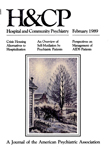A Community of Buddies: Support Groups for Veterans Forced Into Early Retirement
Abstract
Ongoing support groups for veterans who have made a poor adjustment to involuntary early retirement are offered by a mental hygiene clinic in a Veterans Administration hospital. Most of the veterans have been forced to retire for medical reasons. The groups are intended to strengthen their support systems and to reduce the negative psychosocial consequences of involuntary early retirement, such as isolation, boredom, depression, and impaired social relationships. A survey of group members indicated their functioning had improved after group participation. They reported better mental health, improved social relationships, higher activity levels, and greater satisfaction with retirement.
Access content
To read the fulltext, please use one of the options below to sign in or purchase access.- Personal login
- Institutional Login
- Sign in via OpenAthens
- Register for access
-
Please login/register if you wish to pair your device and check access availability.
Not a subscriber?
PsychiatryOnline subscription options offer access to the DSM-5 library, books, journals, CME, and patient resources. This all-in-one virtual library provides psychiatrists and mental health professionals with key resources for diagnosis, treatment, research, and professional development.
Need more help? PsychiatryOnline Customer Service may be reached by emailing [email protected] or by calling 800-368-5777 (in the U.S.) or 703-907-7322 (outside the U.S.).



